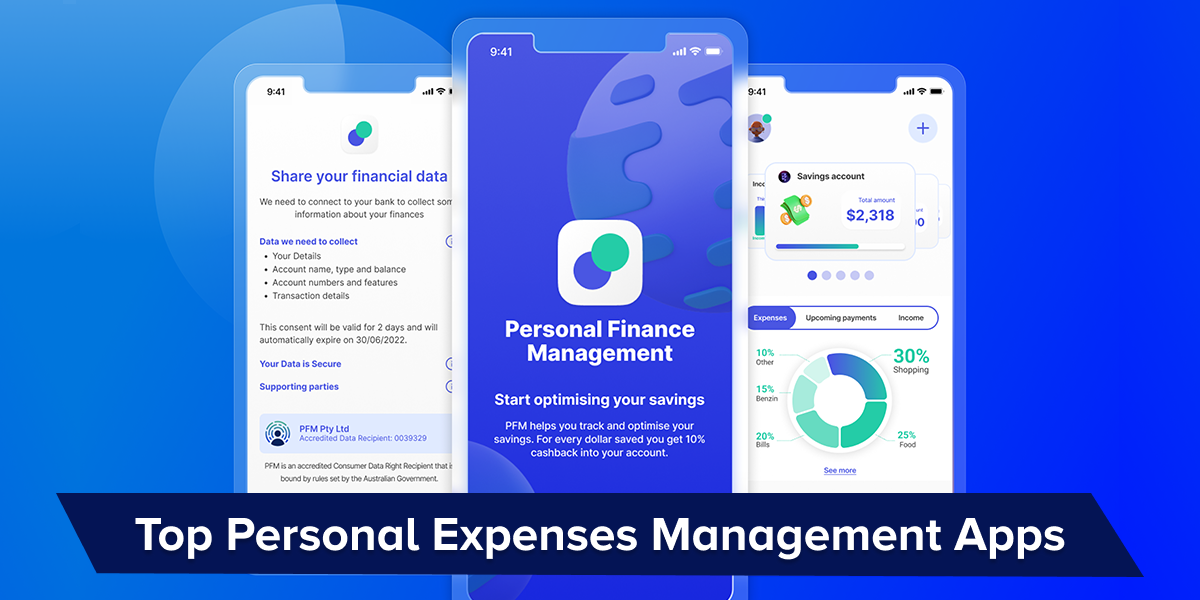
Top Personal Expenses Management Apps to Help You from Going Broke
- By Keith Laurance
- 25-09-2023
- Technology
Toward the end of the pay cycle, I scan the QR code, make payments, and keep my fingers crossed that the payment isn't declined!
This was my story a few months back. I make decent money, but I needed to understand how it fell short towards the end of the month.
If you sail the same boat, I'll take you to the shore here. Among the plethora of fintech app ideas in the market, one trending these days is the "Personal Expense Management App."
Before we get into how and what these applications are, let's see the key players in the market of personal expense management apps.
Top Expense Management Apps to Help You From Going Broke!
When looking for expense management tricks and tips, I found a few applications offering services to keep your expenses in check. The fintech app development companies take care of all the practical aspects when developing such apps. The best ones are listed here.
Mint: Your Financial Command Center
Everyone I encountered suggested Mint as one of the best personal finance management apps. It stands as a pioneer in the arena and offers the best services. You can integrate "n" financial accounts into this app and manage your aggregate income and expenses from a single place.
The app categorizes your expenses under different categories to give you an insight into your spending patterns.
Yes, it would keep reminding you of that extra cup of Chamberlain that you bought.
You can set a fixed budget for each category and track your spending to ensure you stay within the limit—an excellent way to start cutting on those extra fries and coffees.
YNAB: Mastering Your Dollars
It is your elder sibling taking charge of your finances. The application takes a proactive approach to help you manage your expenses in a way that enables you to prioritize the right spending choices, eliminate wasteful expenditures, and keep a part of your income as savings and investments.
You Need A Budget (YNAB) ensures your money works for you and the budgeting goal aligns with your final financial objective.
Many FinTech mobile app development companies work on similar models to create personal expense management apps that help users from going broke.
PocketGuard: A Guardian for Your Wallet
The application is perfect to help you manage your finances. The application gives you a genre-wise expenditure review of your expenses for the month. It includes expenditures on food delivery applications, grocery delivery apps, eCommerce applications, etc.
The app connects your bank accounts and credit cards to ensure you get all online transactions on record. PocketGuard's intuitive interface lets users make smart decisions. They can accordingly reduce their expenditure and redirect funds to make smarter decisions.
Goodbudget: Modern Envelope Budgeting
We may advance to a brighter future, but a few things done traditionally are more effective. Goodbudget is an application that uses a modern twist to the traditional envelope budgeting system. The user assigns a certain amount to virtual envelopes of different spending categories.
With each expense, you'd be reminded of the amount left, thus, helping you make a wiser decision next time. The application, more than budgeting, promotes "Responsible Spending," which allows users to avoid overspending on things that aren't required.
This application is especially for you if you have recently started earning or just got some pocket money.
Wally: Simplifying Expense Tracking
One significant aspect of personal expense management is expense tracking. Wally allows you to enter your expenses manually or by simply uploading the pictures of your receipts (You're building two habits here: ask for the bill always and record your payment without a miss).
The simple-to-use interface and expense categories give users insight into their spending behavior.
Set a saving goal on the applications and monitor your progress.
And if you achieve the goal, treat yourself to that Waffle you have been craving!
Personal Capital: Beyond Budgeting
Budgeting is a significant part of expense management, but you must also consider Investments. Personal Capital is recommended by many for its ability to record and reflect expenses and investments. You can have a holistic overview of your real-time financial situation and make decisions.
The application is more about recording and managing your investments and other expenses.
So, if you are someone who invests, this is exactly what you are looking for to bring your finances in line with your goals.
Simplifi by Quicken: Streamlined Financial Management
Don't want an application with many features and functions?
Install Simplifi. The app has a simple and practical approach to managing finances. The application categorizes transactions, checks bills, helps set financial goals, manages expenses, and helps achieve saving goals.
Users can quickly grasp their financial status and make well-informed decisions with an easy-to-understand and graphical representation of the expenses.
EveryDollar: Giving Every Dollar a Purpose
And who wouldn't trust a solution by financial guru Dave Ramsey?
EveryDollar helps users assign each task some specific amount. The application works on a zero-based budgeting model. Thus, you are free of extra dollars to overspend because you have a dollar for everything you need.
The functioning and features of the application are designed and developed according to Ramsey's financial strategy and philosophy.
Expensify: Beyond Business Expenses
We have talked about personal expense management, investment management, etc. What we need to include in our discussions is business expense management. If you are looking for an expense management app for personal and business expenses, then Expensify is for you.
The application is quite popular among business people and helps one understand their budget better. With each aspect of your expense being on record, you can check your monthly expenditure and see where you can make cuts to meet your financial goals.
Pocket Expense: A Holistic View of Finances
A quick look into your expense pattern helps you build a better financial roadmap and set realistic goals. As the name suggests, Pocket Expense manages your pocket expenses and records all your transactions, budgets, and bills.
With a quick look at where you are spending and your extra expenses, you can quickly build plans and strategies to achieve your financial goals each year.
Now, let's face the harsh reality!
Just installing these applications isn't going to help. You'll have to take the time to track your expenses, review your spending habits, and build a lifestyle that aligns with your financial goals.
“If you want to be financially free, you need to become a different person than you are today and let go of whatever has held you back in the past.”
— Robert Kiyosaki
To be a different person, just stick to a certain lifestyle and see where you grow!
How? Don't worry; here are some valuable tips to help you manage your expenses and make the most of these apps.
Tips to Manage Your Personal Expenses and Achieve Your Financial Goals
One thing is sure: for personal expense management; you must be honest with yourself. Skipping adding those cash expenses to your daily budget will not help you. There are so many ways to record and track your expenses and receipts.
If you are committed to better managing your money and changing your spending habits to meet your financial goals, follow these tips:
Have a Budget
I know you've tried umpteen times making a budget and ditching it. This time be realistic and try again. Review your budget once a week and track where you spend extra. To make a budget, you can stick to the 50:30:20 rule of money.
50:30:20 Rule of Money
50% of Your Income: This goes to managing your living expenses. Basically, your necessities must cost a maximum of 50% of your monthly income.
30% of Your Income: This must go to your luxuries and investments. Eating out, ordering online, etc., as well as your investments.
20% of Your Income: This is your savings. Keep 20% of your income away as savings. And yes, no matter what, don't touch those savings.
Clear Your Debt
Limit your expenditure a little, and clear your debts in a month. Yeah, I know you can manage the debt a little every month, but why not clear it once and for all? This would make you feel better and more confident about your financial situation.
You do not have to worry about the same debt each month. Try managing your month on a fixed income.
Many loan lending and advance payday applications let you borrow from them, but the cycle is vicious.
Unsubscribe Unwanted Applications
Don't use an app and still have a monthly recurring payment of a few bucks. Save that!
If there are applications that you don't use, unsubscribe. Saving a little each month would result in a significant amount at the end of the year.
Say No to Extra Expenses
Cut that extra coffee, fries, etc. If you take away your food four times a week, reduce it to two or three. Cook sometimes. This would help you develop a new habit of cooking and keep you engaged in productive activity.
Idea!
Why not ask your friends to stop by and cook together as a bonding activity? Cool na!
Strict No to Impulsive Shopping
A lot of people often need help managing expenses because of impulsive shopping. Control your shopping spree when you feel like buying something without thinking if you need it or not.
Take a day before you ensure the purchase. This may sound weird, but it helps you save tons!
Trust My Words!
Save and Forget
As said before, save a percentage of your salary. Keep your savings in a different account. And forget that you have it!
Not focusing on your "Emergency Fund" is one mistake you want to avoid. Depending on your city and income, you can have an emergency fund for two to six months.
How many months can you survive if your primary source of income fails?
If the answer is at least a month, try to save better. But if the answer is none, then you are in a lot of trouble.
Expenses are less about managing where you spend and more about how much you save.
Pay Your Bills on Time
Never delay your bill payments. There may be certain payments and EMIs that you have to pay monthly. Make sure you do it on time. Many people wait for recurring payments until the last dates and may need more funds on the due date.
That's why as the bill is generated, pay it, and the rest of the amount you have to your luxuries.
Delaying bill payments is one of the reasons you need to take debt and end up being broke.
**A Bonus to Not Miss**
Find a Secondary Source of Income
No matter how much you earn, you'll feel what you make is less. Instead of relying on just one source of income, generate multiple sources for side income. This would help you survive any crisis and give you confidence.
Also considering how volatile the market is, a side hustle or a secondary source of income is a good idea. This would also let you lead the life that you want to without compromising any aspect of your lifestyle.
Woah!
Yeah…Managing expenses is a challenge especially when you are busy taking care of yourself and providing yourself with your dream life.
But simply installing a personal expense management app and sticking to these basic tips can help you be at the top of your game and save enough.
The Final Words!
Yes, managing personal expenses may seem like a cakewalk when you read or write about it, but it turns into a herculean task when you actually have to do it. If you are looking for a reliable and easy-to-use solution that lets you take care of the money in your account then trusting your instincts and installing personal expense management apps can do wonders for you.
These applications along with investment apps in recent years gained popularity as they help you keep track of your expenses and manage them the right way!
Recent blog
.jpg)
Can artificial intelligence help farmers to feed 10 Billion people?
Artificial Intelligence | 06-05-2024
How NASA Uses Web Design to Optimize User Experience in Space Control
Web Design | 03-05-2024




